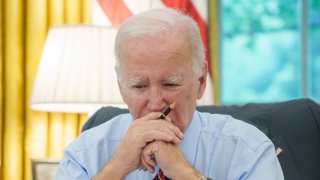The Federal Reserve Could Start a Financial Crisis
A key point that the Federal Reserve chooses to ignore is that its high-interest rate policy heightens the chances of a financial crisis.
Rudi Dornbusch, the late MIT economist, said of the Mexican central bank that he could understand it making mistakes. After all, its board was composed of humans. However, what he could not understand was how the same people could keep making the same mistakes time after time.
Judging by Federal Reserve Chairman Jerome Powell’s press conference yesterday, where he omitted to reference heightened financial system risks as a major concern, we have to wonder whether Dornbusch’s incredulity might also apply to the Fed.
In 2008, the Fed made the major mistake of underplaying the risks that the subprime loan and housing market troubles posed to the country’s economic outlook. The net upshot was the 2008–2009 Great Economic Recession. Today, the Fed is underplaying the significant risks posed to the banking system by the recent spike in Treasury bond yields and the prospective wave of commercial real estate loan defaults. That all too likely is paving the way for a hard economic landing before the middle of next year.
As late as March 2008, then-Fed Chair Ben Bernanke assured us that there was little reason to worry about the subprime loan defaults and the housing market bust that were unfolding. In fact, as late as June 2008, on the very eve of the Lehman bankruptcy, the Fed continued to raise interest rates. The net result of the Fed’s misjudgment was the deepest postwar economic recession up to that time.
Fast forward to today, and the Fed is sticking to its mantra that interest rates need to stay high for longer in order to regain inflation control. By this, the Fed means that it has no intention to reduce interest rates anytime soon after raising interest rates by 5.25 percent over the past eighteen months. Instead, Mr. Powell has been at pains to insist that the Fed is not removing the possibility that interest rates might have to be raised at its next meeting in December.
A key point that the Federal Reserve chooses to ignore is that its high-interest rate policy heightens the chances of a financial crisis. This is all the more surprising given how close we came to a full-blown financial crisis earlier this year with the failure of Silicon Valley Bank and First Republic Bank, the second and third U.S. largest bank failures on record. Those failures were all too reminiscent of Bear Stearns’ collapse in March 2008 that, in hindsight, was a harbinger of very much worse to come.
Even before the recent spike in Treasury bond yields to around 5 percent, the U.S. banking system was estimated to have $620 billion in mark-to-market losses as a result of a steep decline in their bond portfolios’ value. The recent decline in Treasury bond prices will add another few hundred billion dollars to those losses. This could pose solvency issues for the regional banks, which not only have large bond portfolios but also have around 18 percent of their balance sheet exposed to troubled commercial real estate lending.
Unfortunately, there can be little doubt that we will soon be experiencing a wave of commercial real estate loan defaults. Over the next two years, it is estimated that more than $1 trillion in commercial property loans fall due. It is difficult to see how these loans can be rolled over without default when post-Covid commercial occupancy rates remain so low and when interest rates today are so much higher than they were when those loans were contracted. According to a recent Social Science Research Network study, all of this could lead to some 200 bank regional bank failures.
By hewing to a very tight monetary policy stance, Mr. Powell seems to want to avoid going down in history as another Arthur Burns who allowed inflation to surge under his watch in the 1970s. With a financial crisis in prospect that could lead to a deep economic recession, Mr. Powell would be well advised to worry more about going down in history as another Alan Greenspan or Ben Bernanke who paved the way for a recession by turning a blind eye to the financial market risks that were in plain sight.
Desmond Lachman is a senior fellow at the American Enterprise Institute and served as a deputy director in the International Monetary Fund’s Policy Development and Review Department, as well as the chief emerging-market economic strategist at Salomon Smith Barney.
Image: Creative Commons.

